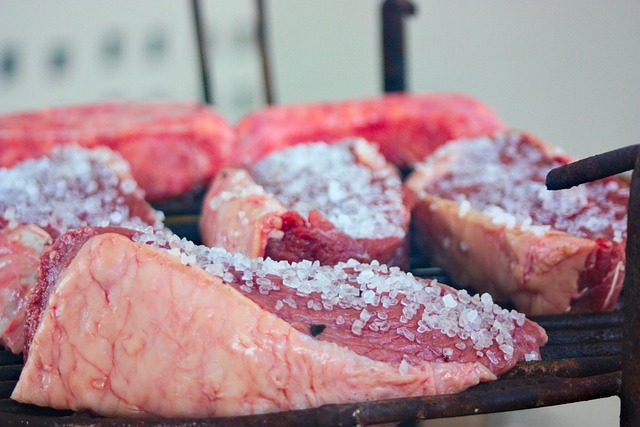Muscle soreness after intense exercise peaks 24-72 hours post-workout (DOMP). Kratom and alcohol may offer temporary relief, but combining them is risky due to potential adverse effects on the central nervous system. Instead, explore evidence-based strategies like regular exercise, proper hydration, and balanced nutrition for long-term muscle soreness relief. Personalize your workout plan based on body composition, injury history, and recovery preferences. Avoid substances like kratom and alcohol that can interfere with natural recovery processes.
Feeling achy after a workout? Muscle soreness is common, but chronic pain shouldn’t hold you back. This guide explores effective strategies for relief, focusing on the power of personalized exercise routines. We’ll delve into the science behind muscle soreness, debunking myths about mixing kratom and alcohol as remedies. Learn how to design a tailored plan that targets your specific needs, promoting healing and enhancing your fitness journey.
- Understanding Muscle Soreness and Its Causes
- The Role of Kratom and Alcohol in Relieving Soreness: What You Need to Know
- Crafting a Personalized Workout Plan for Effective Relief
Understanding Muscle Soreness and Its Causes

Muscle soreness is a common post-workout experience, often described as a delayed onset muscle pain (DOMP). It typically peaks 24 to 72 hours after exercise and subsides within a week. This discomfort arises from microscopic tears in muscle fibers during intense physical activity. When muscles are pushed beyond their usual limits, these micro-tears cause inflammation and trigger nerve endings, leading to the sensation of pain.
While it might be tempting to alleviate soreness with substances like kratom or alcohol, mixing these with each other is generally not recommended. Kratom, a natural herb known for its analgesic properties, can interact with alcohol in ways that may increase side effects or diminish their intended benefits. Intense physical activity already puts stress on the body; adding potentially harmful substances can complicate recovery and delay relief from muscle soreness.
The Role of Kratom and Alcohol in Relieving Soreness: What You Need to Know

Mixing kratom and alcohol is a topic that has gained some attention, but it’s crucial to understand the potential implications before considering this combination. While both substances have been used for their pain-relieving properties, combining them can lead to unexpected outcomes. Kratom, known for its opioid-like effects, is often used to manage muscle soreness and fatigue; however, when mixed with alcohol, it may enhance the risk of adverse reactions due to their combined depressive effects on the central nervous system.
Alcohol can exacerbate muscle soreness by impairing muscle recovery and increasing inflammation. Combining it with kratom, which already interacts with opioid receptors, might intensify these effects, leading to more severe side effects such as dizziness, nausea, and even respiratory depression. It’s important for individuals aiming to alleviate muscle soreness to explore evidence-based strategies like regular exercise, proper stretching, hydration, and balanced nutrition rather than relying on unproven or potentially dangerous combinations like kratom and alcohol.
Crafting a Personalized Workout Plan for Effective Relief

Crafting a personalized workout plan is essential for effectively alleviating muscle soreness. Unlike one-size-fits-all routines, tailored exercises consider an individual’s unique body composition, injury history, and recovery preferences. A good starting point is identifying the root cause of the soreness. Is it due to intense physical activity, inactivity, or stress? Once understood, a targeted approach can be taken. For instance, light yoga or swimming might be recommended for gentle recovery, while specific muscle groups could be isolated and strengthened through targeted exercises for more acute cases.
When designing your plan, mix in various types of activities like strength training, cardio, and flexibility work. Incorporating elements from each category ensures a balanced routine that challenges the body without overloading it. Moreover, listening to your body is crucial. Adjustments might be needed based on how you feel during or after workouts. It’s also important to note that certain substances, like kratom and alcohol, can interfere with recovery and muscle soreness relief. Avoiding or minimizing their consumption alongside a structured workout regimen can significantly enhance the effectiveness of your personalized plan.
After exploring the causes of muscle soreness and examining unconventional methods like kratom and alcohol, it’s clear that crafting a personalized workout plan is key to effective relief. While mixing kratom and alcohol for sore muscles may seem enticing, it’s crucial to understand their individual effects and potential risks. A tailored routine, focusing on specific muscle groups and incorporating targeted exercises and recovery techniques, offers a safer and more sustainable approach to managing muscle soreness. By combining this strategy with proper hydration and nutrition, you can achieve lasting relief and enhance your overall well-being.














